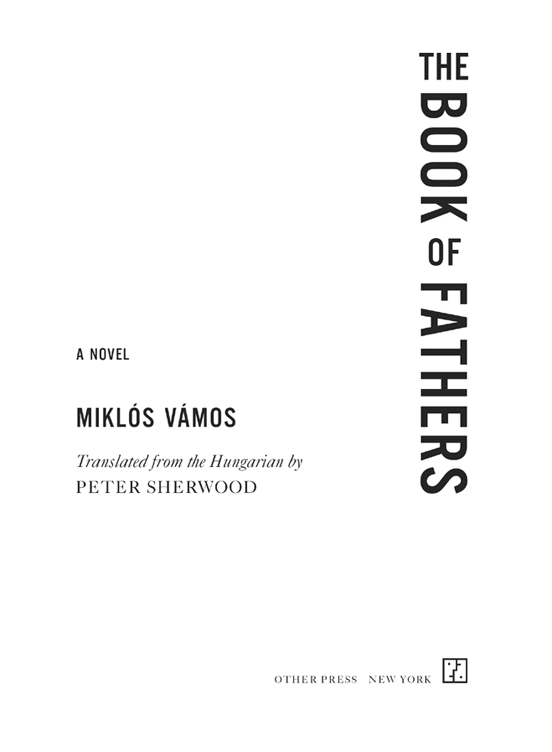
The Book of Fathers
A Novel
- اطلاعات
- نقد و بررسی
- دیدگاه کاربران
نقد و بررسی

August 3, 2009
In this sprawling chronicle of the Csillag family, celebrated Hungarian author Vámos depicts the lives of 12 generations of men, each a first-born son, and in the process offers a whimsical 400-year history of his native country. Each son is graced with the ability to envision events from the past as well as the future; these gifted men maintain a “Book of Fathers,” which is simultaneously a mundane and inspired record of the family, containing everything from a list of songs and arias favored by one father to testaments about inheriting an heirloom. Each of the novel's 12 chapters is devoted to the life of a father as it plays out against Hungary's turbulent political context; one finds fortune in the wine industry, another is a brilliant gambler, another oversees a fancy shoe shop, another runs a glass factory and yet another is a master linguist. While the episodic structure can inspire a plodding feel, the book has many sublime moments, from meditations on the nature of time to a sly investigation of how words accumulate to form books.

Starred review from September 15, 2009
A bestseller in Hungary, this family chronicle focuses on firstborn sons across 12 generations.
Kornl Csillag is born in 1701; his many-times-removed scion Konrád Csillag as a three-year-old witnesses the famous European solar eclipse in 1999. In between we meet multifarious Csillags and Sterns (Hungarian and German respectively for"star"). Despite the diversity of characters over the course of three centuries, certain family traits become familiar. The sons, who later become fathers and then grandfathers, have a supra-sensory ability to connect with their ancestors; they have visions of the lives that have unfolded before they appeared on earth. They tend to be supremely intelligent, gifted with an ability to read and write at an astonishingly early age, and many are excellent singers. In addition, they struggle with ambivalence over their Jewish identity. Some embrace it; others repudiate it, most notably Balázs Csillag, who converts to Catholicism in August 1945. Throughout the narrative, the patriarchs record their thoughts, visions and experiences in the"Book of Fathers," which is handed down from generation to generation, occasionally hidden and rediscovered. Family history entwines with Hungarian history; we witness the rise and fall of scholars, shopkeepers and intellectuals against a background of economic turmoil, political intrigue and the struggle for independence. One of the most engaging characters is Henryk Csillag-Stern. Born in New York, he finds himself drawn to the mother country and emigrates back to Pcs, the town of his ancestors. Henryk goes on a mission to uncover his family history, marries a local girl and fathers the remarkable Konrád, who"at a year and a half was able to recall and recite stories he had heard, word for word"—just like his forbears.
Widely read in his homeland but rarely translated into English, Vámos should win a new American audience with his beautifully crafted novel of connection and continuity.
(COPYRIGHT (2009) KIRKUS REVIEWS/NIELSEN BUSINESS MEDIA, INC. ALL RIGHTS RESERVED.)

October 1, 2009
Vámos's first novel to be published in English is uncommon in its scope and structure, following 12 generations of a Hungarian family over the past 300 years through the lives of each generation's eldest son. Rather than being fully developed, these men represent all of Hungary through a variety of professions (from vintners and vocalists to businessmen and educators) and live throughout greater Hungary, Germany, and the United States. The chapters read more like short stories, adroitly linked by personal and historical themes. One pertains to the family's Jewish heritage: whether the men accept, embrace, suppress, or reject their patrimony, history is determined to judge them by it. In a final note, Vámos admits that he wanted to write a novel for his father, secretary to László Rajk, minister of the interior and then foreign affairs in the late 1940s who was executed after a show trial. VERDICT Although readers will be swept up and entertained by the breadth of the family's history, they might end up wishing that Vámos had focused more on his relationship with his father, with Rajk's tragic story as a backdrop.K.H. Cumiskey, Duke Univ., Durham, NC
Copyright 2009 Library Journal, LLC Used with permission.




دیدگاه کاربران